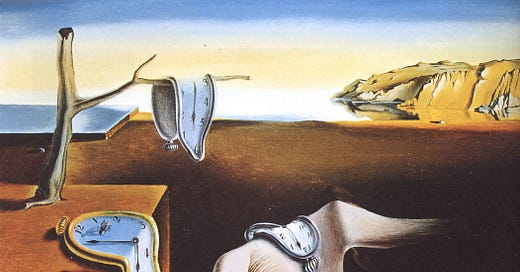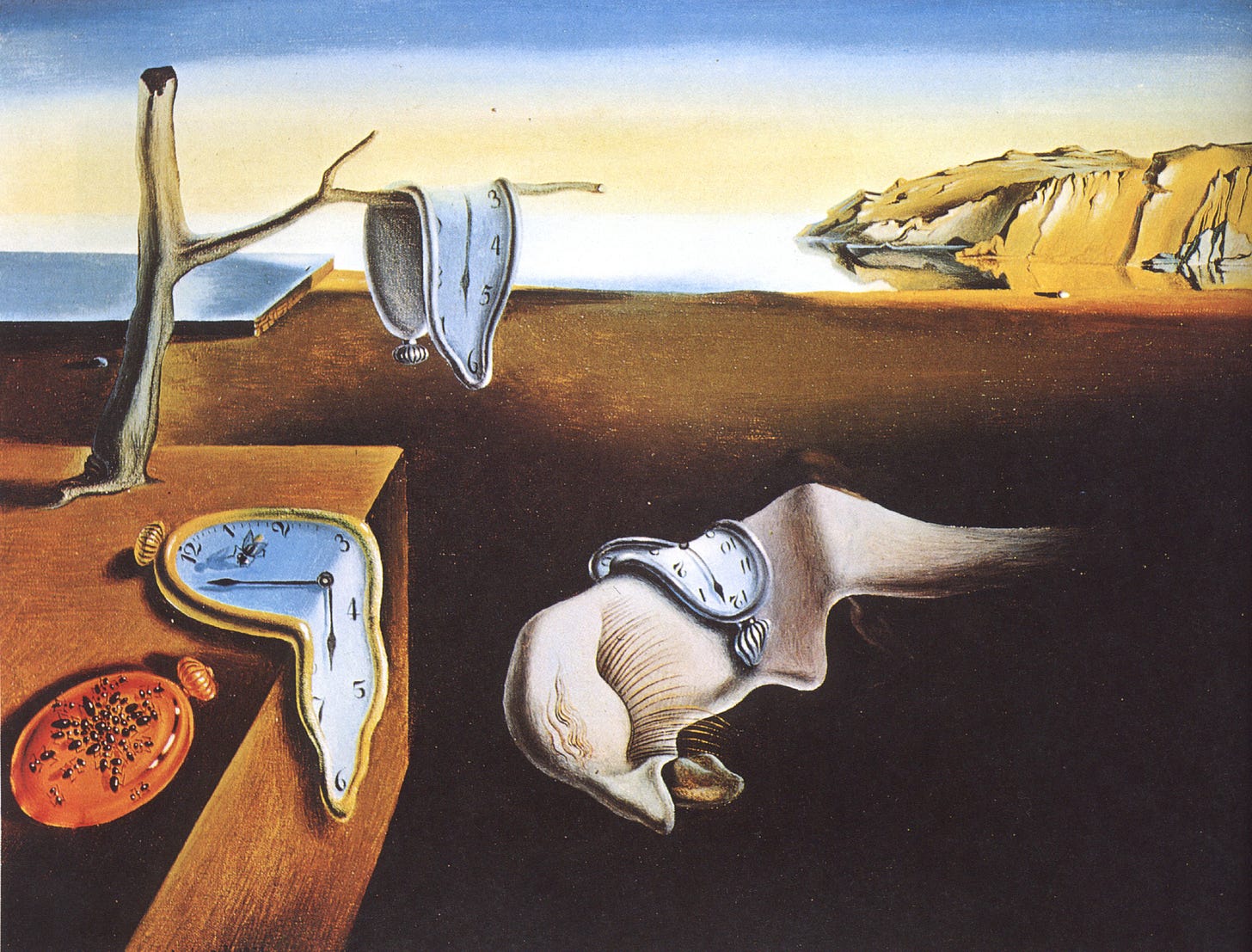Do you ever stop counting?
At what point do you just accept that you don't drink anymore and stop keeping track of how long it has been since you did?
AASL is 100% subscriber-funded. If you think AASL is a valuable resource and are in a position to upgrade to a paid subscription, please consider doing so. Either way, I’m glad you’re here!
Hi Katie,
I think I have two questions, but they might just be the same question. I'm a longtime heavy drinker, and I'm 163 days sober this time. I've quit before, for 11 months, and 18 months, and this time feels different because I want it to be: now it's about doing something versus not doing something - making it a way of life instead of a deprivation. So my question is: do you ever just stop thinking about it? Or is it always a daily choice you make? I see people saying things like "37 years sober," and I always wonder: at what point do you just accept that this is the way it is, and you don't keep track? Am I just thinking about this the wrong way?
I know I could potentially ask this in a meeting, but I've never been to a meeting because I have some concerns about them; my biggest one is that talking about drinking just makes me feel like drinking. I'm also not big on the powerlessness idea: for me, if I don't buy any, there won't be any, so there's always agency on my part. This is the first time I've kept track of days; I wondered if it was important to do here, and it's helped me sustain other habits, so why not? But even that makes me wonder if keeping track is also keeping me bound to that former lifestyle somehow. I'm interested in your thoughts.
—Counting
Hi Counting,
Congratulations on 163 days! That’s a huge accomplishment, and I’m glad you’re thinking of sobriety in a new way. To answer your first question, yes, there are times when I stop thinking about how much sober time I have. Unless someone asks, I typically only think about how long I’ve been sober when it’s my actual sobriety birthday or the Christmas and New Year’s holidays. I’ve actually messed up the math several times when writing something or answering people who ask. So not only did I stop counting the days at some point, but I’ve lost track of the years on more than one occasion.
Whether or not counting days is helpful to you probably comes down to how thinking about those days makes you feel. When you think about the 163+ days you have, do you feel proud? Or do you feel like you’ve spent 163+ days depriving yourself? Do you feel physically and mentally healthier now than on day one or two? Or do you feel it’s become harder as you focus on the number of days ticking upward?
There is solid evidence that tracking streaks helps maintain habits, but maybe counting days isn’t right for you. Maybe it would be more helpful to track weeks so that every Sunday or Monday, you recognize that you’ve added another week to the streak. If this is the first time you’ve tracked days and you haven’t felt like it’s negatively affected you, I might try sticking with it. But if it feels like it’s messing with your head, maybe adjust slightly to a different way of marking the streak. Or maybe instead of counting days without alcohol, you think of it as how many hangover-free days you have. That way, you’re focusing on what you’re gaining, not what you’re going without.
I can’t pinpoint exactly when I stopped keeping track of the days, but at some point, not drinking felt normal. It suddenly wasn’t something I was missing; it just became kind of irrelevant to my daily life. I definitely couldn’t write about alcohol use and recovery every week if feelings of craving or deprivation always accompanied it. When I miss alcohol or fantasize about drinking, it falls into a fantasy realm. What if I could drink is in the same category as what would I do if I won the lottery and what if I could fly?
Alcoholics Anonymous isn’t the right program for everyone, and I know some people struggle with the idea of being powerless over alcohol, which is so central to the program. I have no dog in the fight about whether you attend meetings. It was right for me for a long time, and then it became something that didn’t make sense for me anymore. There are plenty of alternatives that still have a community support aspect. (I will get to those in a minute.)
Personally, the notion of being powerless over alcohol is really helpful to me, so I want to explain how I think about it, even if you decide it doesn’t make sense for you. In the beginning, because I was so physically and psychologically dependent on alcohol, powerlessness was at least partially about the inability to not go into that liquor store and buy a bottle. Every cell of my body told me you need this, you need this; you’ll die if you don’t have this.
After I got sober, being powerless over alcohol became—and remains—about something else: It’s about what happens after I ingest alcohol, not before. From the very first time I drank, I wanted more and then more and some more after that. I would promise myself or others that I’d have one or two drinks and end up with an empty bottle and no idea where I’d gone wrong.
Again, that may not be your experience or make you comfortable with the concept, but part of what helped me accept sobriety as part of my normal daily life was having a shorthand to remember what happens when I drink. For me, the word “powerless” does that. It’s also why any fantasies I have about controlling my drinking are in the same category as literal magic. It’s simply a capability I do not have.
There are plenty of support groups and programs other than 12-step groups. I have a list of several free ones here. [Readers, if you know of others that should be on the list, please let me know! In particular, I’m looking for free or low-cost offerings, but all recommendations are welcome.]
If you’ve never been to an AA meeting, it probably wouldn’t hurt to try one (they’re free and everywhere, so it’s easy to test it out). Before I went, I also thought talking about drinking was a stupid way to quit drinking, but most of what people shared ended up being about the very good reasons they no longer drink—or the very good reasons they were trying to quit. Which is still talking about drinking to some extent, but I didn’t find it particularly triggering. If you hate it (and you might!), you never have to go back.
Whether it’s counting days or something else, I hope you find a way to track and celebrate your sobriety accomplishments because they’re absolutely deserving of recognition.
Send questions and feedback to askasoberlady@gmail.com. By sending a question, you agree to let me reprint it in the newsletter with your name redacted or changed. Emails may be edited for length or clarity.
I’m not a doctor or mental health professional, so my advice shouldn’t be construed as medical or therapeutic. You are free to take or leave it.






Admitting powerless over alcohol was such a relief for me. It took a lot of the guilt and shame out of my addiction because I knew my alcoholism wasn’t a choice on my part. I can only choose whether or not I take that first drink and after that, I have no power in what will happen next. For me, it’s not about loss of agency or defeat, it’s about being honest with myself and taking back control of my life.
AA (and more specifically, working the 12 steps) has been a life changer for me. I started going after rehab and it has become the foundation of my sobriety, but I understand your reservations. You should try a few meetings - maybe start with a woman’s or men’s meeting, or a Big Book or Step study - and see if anything resonates with you.
PS - Congrats on 163 days - that is no easy feat! Keep going :)
I've stopped drinking off and on for four decades. This time, it's going to stick because I've made up my mind that the health benefits of sobriety outweigh the pleasures of drinking. What's helping me is the free app I Am Sober. It counts days, weeks months, years, as well as allowing you to calculate your own motivators -- money, time, calories, health changes, etc. I find it very empowering to see the months tick off. Every day I pledge to stay sober, and the app gives me a daily motivation and an evening check-in. But as I approach 2 years sober, I know I'm going to let the app continue to count the days, but I will not be doing the daily review. I know it's on my phone should I ever need it.